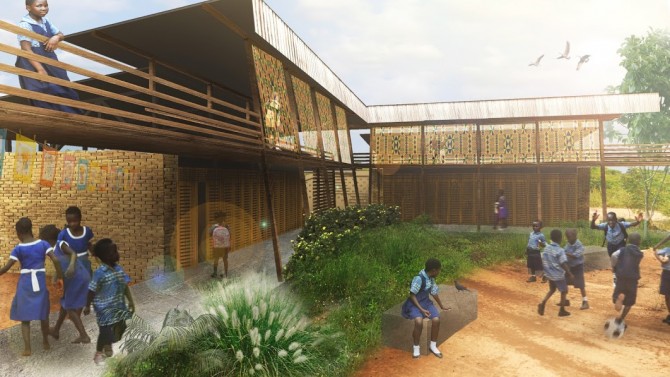From an ocean away, students design a girls’ school in Ghana
By Blaine Friedlander
About 5,287 miles from Ithaca, near the banks of Ghana’s Volta River, a primary and junior high school for girls is rising from the collective imagination and brain power of the Cornell University Sustainable Design (CUSD) team, under the university's Systems Engineering program.
With a thoughtful blueprint and an allegiance to sustainability, the Voices of African Mothers Girls’ Academy soon will educate, nurture and inspire about 500 girls annually, with plans to open in 2018.
“It’s not just concrete blocks. We’re not just putting up a building. Care went into the building’s design for education; it was designed for the students,” said Claudia Nielsen ’18, who led the Sustainability Education Ghana project team with Arielle Tannin ’18. Voices of African Mothers, a United Nations-affiliated nongovernmental agency, is now fundraising for the project.
On a 200-acre tract in Sogakope, Ghana, the group sought collaboration to design a school that could allow children to advance economically.
Through the networking of Sam Ritholtz ’14, who led Big Red Relief as an undergraduate, CUSD connected to Nana-Fosu Randall, president and founder of Voices of African Mothers.
In summer 2015, Nielsen, Tannin and Dan Preston ’17 traveled to Ghana, funded by a Community-Engaged Travel Grant. “Going to Ghana after my freshman year solidified my time investment in the project,” said Tannin. “Seeing everything firsthand, experiencing the project’s realness, fueled my excitement.”
Team members conducted in-depth interviews with students and stakeholders to tailor the school to their needs. More than two years later, with blueprints in hand, local contractors are building the academy, which is expected to be finished in phases. It may be occupied as soon as January 2018.
Nielsen and Tannin credit Sirietta Simoncini, a lecturer in systems engineering and a team adviser, who taught the group about human-centered design. This project landed under the aegis of the Systems Engineering program, where several graduate students worked to help complete it.
“Human-centric design doesn’t only have to do with the actual design of physical buildings or structures,” said Tannin. “It’s more of a modality of problem-solving, which in my field of information sciences they tend to stress pretty strongly.”
In building a school an ocean away, the Cornell group faced hundreds of challenges. The team members, all with different talents, morphed into a tightly organized group and functioned as a unit, rather than separately, Nielsen and Tannin said. This semester, as Tannin and Nielsen finish their undergraduate work, Ana Moura-Cook ’19 became the project director.
One important school feature: a quiet tin roof. When it rains, tin roofs are notoriously noisy, making it hard for students to pay attention. “This was part of our empathy field work, listening to students and understanding their needs,” Tannin said. The CUSD group solved the problem by baffling the roof with reused wood chips, in compliance with the local fire ordinances and building code.
The school will take advantage of wind for cooling, and the roof is oriented to prevent dust from rushing into the classrooms. It will feature learning gardens, a neighborhood health center (for easy community access) and natural light.
Cornell student architects developed the plans, and student engineers conducted analyses, calculating truss and beam loads, assessing structural integrity, all while meeting frequently with architects and engineers from Tetra Tech of Ithaca.
The academy’s importance cannot be understated. Team member Anamika Goyal, M.Arch. ’17, spoke about the Ghana school project last spring at the United Nations’ Commission on the Status of Women gathering in New York City.
Goyal – in a seemingly tiny but crucial detail – designed the bathrooms at the school. “So many girls in developing countries drop out of school around age 10 to 12, right when they begin menstruation,” she said. “Providing a safe, clean, adequately private bathroom facility that can help girls stay in school will have a tremendously positive ripple effect at a national level.”
Media Contact
Get Cornell news delivered right to your inbox.
Subscribe